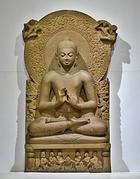
Gautama Buddha (c. 563/480 – c. 483/400 BCE), also known as Siddhārtha Gautama (सिद्धार्थ गौतम) in Sanskrit or Siddhāttha Gotama (शिद्धत्थ गोतम) in Pali, Shakyamuni (i.e. "Sage of the Shakyas") Buddha, or simply the Buddha, after the title of Buddha, was a monk (śramaṇa), mendicant, and sage, on whose teachings Buddhism was founded. He is believed to have lived and taught mostly in the northeastern part of ancient India sometime between the 6th and 4th centuries BCE. Gautama taught a Middle Way between sensual indulgence and the severe asceticism found in the śramaṇa movement common in his region. He later taught throughout other regions of eastern India such as Magadha and Kosala. Gautama is the primary figure in Buddhism. He is believed by Buddhists to be an enlightened teacher who attained full Buddhahood and shared his insights to help sentient beings end rebirth and suffering. Accounts of his life, discourses and monastic rules are believed by Buddhists to have been summarised after his death and memorized by his followers. Various collections of teachings attributed to him were passed down by oral tradition and first committed to writing about 400 years later. In Vaishnava Hinduism, the historic Buddha is considered to be an avatar of the Hindu god Vishnu. Of the ten major avatars of Vishnu, Vaishnavites believe Gautama Buddha to be the ninth and most recent incarnation.









